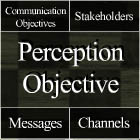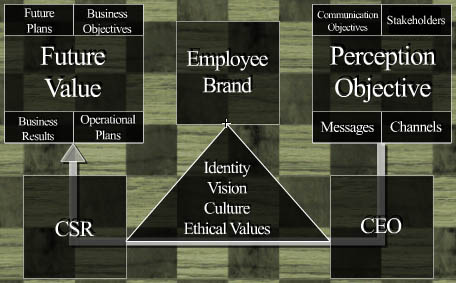In today's global market, corporate reputation management and corporate communication as a management performance are the elements that set a company apart from its competitors and define its distinctive character.
Communication is an essential component in management; not only in private sector but also in public sector and in non-governmental organisations. It is a fact that by communications consultancy companies achieve differentiation that sets themselves apart from their peers; this differentiation is synonymous with reputation management.
Today the business objectives define "success" in private, public sector and in non-governmental organisations they are classified under different titles. Those business objectives regardless of their title would create a competitive future value for the companies. This is the difference between companies that are not in the market today and the ones whose success lasts for decades.

Therefore companies have future plans. Business objectives are defined within those plans and integrated to the structure by operational plans such as production, marketing, human resources, logistics, technology and finance. What is critical for a company is to meet business objectives like "clients, investors, human capital or social values etc."
However this classical approach is not the key for a long lasting corporate existence.
Companies like Enron and Arthur Andersen had this kind of an understanding; however they are not in the market today!
Communication also has tangible objectives within its own discourse. Those objectives devoted to create tangible assets for some social partners (such as clients, employees, investors, media, bureaucrats, local society, local administration etc.) by using messages and various channels. Strategic communication requires this process to be designed and evaluated within a company's future plans, business objectives, and operational plans. Those concepts concluded from various researches evaluate the added value of communication for business results.

Communication creates a tangible added value within a corporate future value.
However, Enron and Arthur Andersen had a similar corporate communication understanding. Then why did they fail?
Corporate reputation sets a company apart from its competitors. It is closely related to integration of the basic elements of "corporate governance" understanding into company's business plans. Communication management, integrated into competitive business world, contribute to achieve differentiation that sets a company apart from its peers with the "understanding of ethics, transparency, accountability, culture, vision of the company and its corporate identity that covers all those factors". However this is not a natural process that is taken for granted.
The broad vision and commitment of CEO; the non-profitable corporate social responsibility policies and employees identifying themselves with their company's corporate values and corporate identity… Each of these has the potential to create tremendous wealth for good governance understanding.

Communication has an added value, only if it covers this process. Only a strategic approach displays the relation of communication between good governance elements and the business results.
The value of reputation is understood when it is lost and the competitors are aware of the fact that this is a vital strategy for success.



